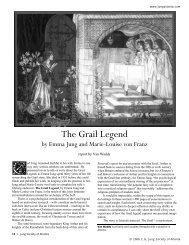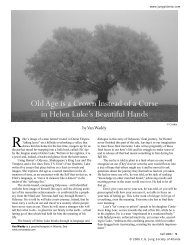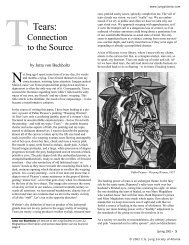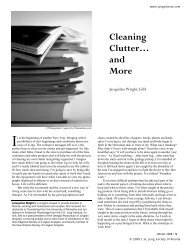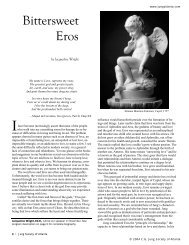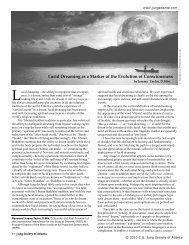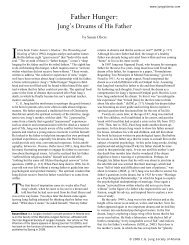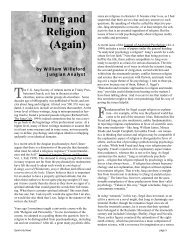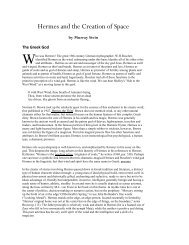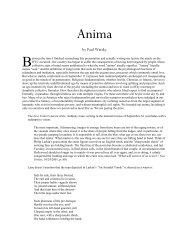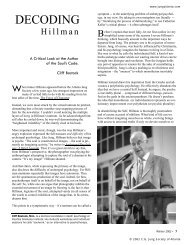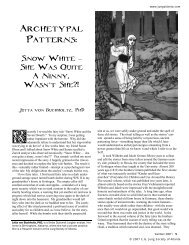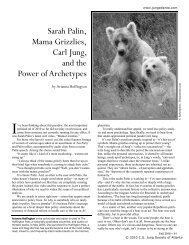My Break with Jung - Virginia Apperson - C.G. Jung Society of Atlanta
My Break with Jung - Virginia Apperson - C.G. Jung Society of Atlanta
My Break with Jung - Virginia Apperson - C.G. Jung Society of Atlanta
You also want an ePaper? Increase the reach of your titles
YUMPU automatically turns print PDFs into web optimized ePapers that Google loves.
C.G. <strong>Jung</strong> <strong>Society</strong><br />
<strong>of</strong> <strong>Atlanta</strong><br />
Advisory Board<br />
John Beebe, M.D.<br />
<strong>Jung</strong>ian Analyst<br />
San Francisco, CA<br />
Jean Shinoda Bolen, M.D.<br />
<strong>Jung</strong>ian Analyst<br />
Mill Valley, CA<br />
Nancy Cater<br />
Editor, Spring Journal<br />
New Orleans, Louisiana<br />
Nonnie Cullipher<br />
Journey Into Wholeness<br />
Brevard, NC<br />
Doug Gatlin<br />
Executive Director<br />
Faith and the City<br />
<strong>Atlanta</strong>, GA<br />
James Hollis, Ph.D.<br />
<strong>Jung</strong>ian Analyst<br />
Houston, TX<br />
John Martin, D.Min<br />
Lecturer<br />
Elizabethtown, TN<br />
Maureen Murdock<br />
Author<br />
Carpinteria, CA<br />
Lloyd Nick<br />
Director<br />
Oglethorpe Museum <strong>of</strong> Art<br />
<strong>Atlanta</strong>, GA<br />
Marie Nygren<br />
Serenbe Farms<br />
Palmetto, GA<br />
Jerry Ruhl, Ph.D.<br />
Director Houston<br />
<strong>Jung</strong> Center<br />
Houston, TX<br />
Dennis Slattery, Ph.D.<br />
Pacifica Graduate Institute<br />
Carpinteria, CA<br />
Stuart Smith, LPC<br />
Link Counseling Center<br />
<strong>Atlanta</strong>, GA<br />
Jeremy Taylor, D.Min<br />
Marin Institute<br />
Fairfield, CA<br />
<strong>My</strong> <strong>Break</strong> <strong>with</strong> <strong>Jung</strong><br />
by <strong>Virginia</strong> <strong>Apperson</strong><br />
www.jungatlanta.com<br />
Women have been in darkness for centuries…. And when women write, they<br />
translate this darkness. Men don’t translate. They begin from a theoretical<br />
platform….<br />
—Marguerite Duras, “Smothered Creativity”<br />
…As when a little Girl<br />
They put me in the Closet—<br />
Because they like me “still”—<br />
Still! Could they have peeped—<br />
And seen my brain-go round—<br />
—Emily Dickinson<br />
K, it was a short-lived one, but a break still the same. And a significant one in my<br />
O own development as a <strong>Jung</strong>ian Analyst. It was December 1993. I was studying for<br />
my final exams at the C.G. <strong>Jung</strong> Institute in Kusnacht. Between the cramming sessions, I<br />
was reading Claire Douglas’s Translate this Darkness about <strong>Jung</strong>’s patient Christiana<br />
Morgan. Using Duras and Dickinson’s words (see above), Douglas gives the reader a<br />
potent whiff <strong>of</strong> what Morgan was up against throughout her life, a longing to translate her<br />
darkness while multiple forces colluded to tame her. Morgan was one <strong>of</strong> <strong>Jung</strong>’s analysands<br />
and the woman behind the visions that were the basis for <strong>Jung</strong>’s “Vision Seminars.” (Some<br />
<strong>of</strong> her “visions” are displayed at Oglethorpe University’s<br />
current Mandala exhibit.) According to Claire<br />
Douglas, <strong>Jung</strong> was intrigued by Morgan’s capacity<br />
to enter the imaginal world, her “passionate earthiness”<br />
and “the spiritual side <strong>of</strong> her sexuality” (p.<br />
150). Morgan had floundered in and out <strong>of</strong> a depression<br />
for years; so she was touched deeply by <strong>Jung</strong>’s<br />
help finding a legitimate place for her unconventional<br />
libido.<br />
Though genuinely impressed by Christiana<br />
Morgan’s facile access to the chthonic realm, <strong>Jung</strong><br />
was handicapped when it came to responsibly<br />
shepherding her towards her own sense <strong>of</strong> self and<br />
empowerment. In what proved to be a cataclysmic<br />
shift in their analytic relationship, he betrayed<br />
Morgan by encouraging her to funnel her idiosyncratic<br />
talents towards her lover, Henry Murray,<br />
through becoming his muse. <strong>Jung</strong> told her, “Your<br />
function is to create a man…[to be] a femme inspiratrice….<br />
You have your ideal <strong>of</strong> him. You must<br />
make him live up to it” (p. 151). And so, <strong>with</strong><br />
<strong>Jung</strong>’s blessing, Morgan and Murray were emboldened<br />
to pursue a relationship based on naïve projec-<br />
<strong>Virginia</strong> <strong>Apperson</strong>'s belief in the creative potential <strong>with</strong>in each <strong>of</strong> us led to her training at the<br />
C.G. <strong>Jung</strong> Institute in Zurich. In addition to her analytic practice, she works <strong>with</strong> couples, leads<br />
dream groups, and lectures on <strong>Jung</strong>ian topics.<br />
Christiana Morgan<br />
© 2012 C.G. <strong>Jung</strong> <strong>Society</strong> <strong>of</strong> <strong>Atlanta</strong>
tions. Furthermore, their romance paralleled <strong>Jung</strong>’s affairs <strong>with</strong><br />
Sabina Spielrein (the subject <strong>of</strong> the recent film, A Dangerous<br />
Method) and Toni Wolff. Apparently all three women shared<br />
similar temperaments and “led [<strong>Jung</strong>] into unfathomed reaches”<br />
(p. 158).<br />
Frankly, I was horrified after reading Translate this Darkness.<br />
Learning <strong>of</strong> <strong>Jung</strong>’s subjugating response to Morgan disturbed<br />
me enough to question whether I wanted to continue my<br />
training, and I considered heading home, sans diploma. In spite<br />
<strong>of</strong> this dis-ease, I took my final exams and then used my thesis<br />
as a way to wrestle <strong>with</strong> the knowledge <strong>of</strong> <strong>Jung</strong>’s egregious<br />
advice to Morgan to sacrifice her individuation in service <strong>of</strong><br />
Murray’s pursuits. Prominent among the <strong>Jung</strong>ian authors that<br />
had resonated <strong>with</strong> me were women such as Marie Louise von<br />
Franz, Sylvia Brinton Perera, Linda Leonard, Marion Woodman,<br />
Clarissa Pinkola Estes, Ann Ulanov, to name a very few.<br />
Their insights, that advanced <strong>Jung</strong>’s ideas around feminine<br />
development in both women and men, helped me enormously<br />
in my own personal development, as well as work <strong>with</strong> my<br />
analysands. Before completing my training, I had to reconcile<br />
the discovery <strong>of</strong> <strong>Jung</strong>’s interference in Morgan’s individuation<br />
that seemed completely at odds <strong>with</strong> what had become most<br />
precious and fundamental in my understanding <strong>of</strong> <strong>Jung</strong>ian<br />
Psychology.<br />
Claire Douglas grappled <strong>with</strong> a related paradox as she tells<br />
a tale as old as time <strong>of</strong> a scintillating woman sidelined and<br />
obscured by the men in her life: men that claimed to admire and<br />
adore her, as long as she served their narcissistic need to project<br />
their feminine potential onto her, rather than recognize such an<br />
animating experience as an opportunity to connect <strong>with</strong> their<br />
own feminine potential. Douglas puts Morgan’s tragedy into<br />
perspective in her description <strong>of</strong> some <strong>of</strong> the most impressive<br />
women in <strong>Jung</strong>’s (and Freud’s) circle that had a:<br />
Beguiling combination <strong>of</strong> vibrancy, charm, quick intuitive<br />
thinking, a deep interest in the world <strong>of</strong> ideas, and a<br />
capacity for exciting and inspiring the men in their<br />
lives. These women tended to manifest a problematical<br />
creativity <strong>of</strong> their own, which penetrated the unconscious<br />
and explored its realms to a depth that fascinated<br />
both Freud and <strong>Jung</strong>. The women were able to form<br />
bridges between their own creative energies and the<br />
creativity at times latent in their analysts. However,<br />
instead <strong>of</strong> cultivating this creativity for their own benefit,<br />
the women were encouraged to project it onto a<br />
series <strong>of</strong> numinous men and to subordinate their own<br />
talents in order to advance the men’s work. Each<br />
poured her talents and energy into the career <strong>of</strong> a male<br />
analyst who took her as a companion. Recently some <strong>of</strong><br />
these women – Lou Andreas-Salome, Anais Nin, Ruth<br />
Mack Brunswick, Beata (Tola) Rank, Toni Wolff,<br />
Sabina Spielrein, and Christiana Morgan – have found a<br />
degree <strong>of</strong> recognition, but all lack a comprehensive and<br />
empathic analysis <strong>of</strong> their struggle as creative women at<br />
the center <strong>of</strong> their own stories. (pp. 12-13).<br />
ouglas generates such an analysis <strong>of</strong> Christiana Morgan’s<br />
D life in her well-documented book. In a similar vain,<br />
though not as responsibly documented, David Cronenberg<br />
brings Sabina Spielrein’s story to an even larger audience <strong>with</strong><br />
his film, A Dangerous Method.<br />
www.jungatlanta.com<br />
As I revisit my initial reading <strong>of</strong> Translate this Darkness<br />
and my subsequent falling out <strong>with</strong> <strong>Jung</strong>, I remember how<br />
important this disillusionment was, challenging me to consider<br />
what mattered most in <strong>Jung</strong>’s visionary theories. To hold the<br />
tension <strong>of</strong> opposites (one <strong>of</strong> <strong>Jung</strong>’s most fundamental concepts)<br />
between <strong>Jung</strong>ian theory and the realization that <strong>Jung</strong> (like all <strong>of</strong><br />
us!) was a flawed, complex-influenced person helped me<br />
through this confusing time. Writing my thesis, “Revising the<br />
Notion <strong>of</strong> Living Happily Ever After: Finding the Gleam in<br />
Your Own Eyes,” provided me the outlet for this wrestling<br />
match. And for weeks on end, I holed up in my tiny apartment<br />
working furiously and feverishly.<br />
As I tried to square the <strong>Jung</strong>ian theory I had come to value<br />
<strong>with</strong> <strong>Jung</strong>’s shortsightedness, I was aware <strong>of</strong> how easy it was to<br />
get stuck in my inflammatory reaction to <strong>Jung</strong>’s duplicity and<br />
lose sight <strong>of</strong> that which I found so life-giving. Similarly, I<br />
imagine many leave A Dangerous Method disgusted—<strong>with</strong><br />
vivid images <strong>of</strong> the sensationalized sadomasochistic sex scenes<br />
between <strong>Jung</strong> and Spielrein—forgetting the portrayal <strong>of</strong> the<br />
intensely curious and radically insightful <strong>Jung</strong>. In contrast,<br />
Douglas balances her exposure <strong>of</strong> <strong>Jung</strong>’s self-serving parochialism<br />
<strong>with</strong> his progressive approach that afforded Morgan an<br />
opportunity to plunge into the rich depths <strong>of</strong> her unconscious,<br />
resurfacing <strong>with</strong> brilliant experiences and images (p. 164). With<br />
her enviable facility for reverie, <strong>Jung</strong> enthusiastically supported<br />
her trances and active imaginations, enabling Morgan to bring<br />
her feeling function to life. From Morgan’s journals, she relates<br />
an evolving heroine’s tale that demanded a “conscious relation<br />
<strong>with</strong> her dark dragon,” rather than the typical hero quest in<br />
which the dragon must be slayed:<br />
Crucially, she did not make the dragon nice, or socially<br />
acceptable, nor did she kiss it in the hope she would be-<br />
Christiana Morgan - drawing for Thematic Apperception Test<br />
Winter 2012 • 5<br />
© 2012 C.G. <strong>Jung</strong> <strong>Society</strong> <strong>of</strong> <strong>Atlanta</strong>
come a beautiful princess and live prettily and happily<br />
ever after [my italics] <strong>with</strong> and for some man. She realized<br />
that a woman hero needed her dragon to stay a dragon.<br />
(p. 172)<br />
Fortified by these visions, Christiana was invigorated by the<br />
possibility <strong>of</strong> a new way <strong>of</strong> living.<br />
Regrettably, the novelty <strong>of</strong> their work together was diverted<br />
because it seems <strong>Jung</strong> was hampered by his patriarchal<br />
prejudice.<br />
As <strong>Jung</strong>…encouraged her visions, his countertransference…grew.<br />
He had known that she was going through a<br />
process similar to his own, but now he realized that she<br />
was doing it in a passionate feminine way. It was as if he<br />
were seeing an alternative world full <strong>of</strong> dynamic images<br />
that simultaneously excited and repelled him; they caught<br />
him between erotic attraction for their discoverer and a<br />
need to dismiss her power. (p. 161)<br />
We learn from Morgan’s journal how resentful she was <strong>of</strong><br />
<strong>Jung</strong>’s directive to make Murray’s achievements her priority<br />
rather than her own: “Came home raging over what he [<strong>Jung</strong>]<br />
had said about me being too lyrical. Then it flashed on me that<br />
he is throwing me back into my problem…. It makes me feel<br />
appallingly alone” (p. 152). Regardless, her attachment need to<br />
be validated by <strong>Jung</strong> and cling to the relationship <strong>with</strong> Murray<br />
trumped her misgivings, a pattern that persisted long after her<br />
work <strong>with</strong> <strong>Jung</strong> in the 20s. A chronic pattern <strong>of</strong> prostration (up<br />
until her death in 1967) grew out <strong>of</strong> <strong>Jung</strong>’s counsel to Morgan,<br />
sprinkled <strong>with</strong> moments <strong>of</strong> exquisite clarity about the anima<br />
identification she was complicit in: “I wish that <strong>with</strong> [Henry] I<br />
didn’t have this feeling <strong>of</strong> a snake in the grass somewhere” (p.<br />
133); “although he gives me much <strong>of</strong> his mind & spirit he<br />
gives me nothing <strong>of</strong> warmth and <strong>of</strong> earthiness” (p. 152). To<br />
remain in the relationship, as it was, precluded her own individuation,<br />
leaving Morgan to carry the “warmth and earthiness,”<br />
and Murray the “mind and spirit,” a classic patriarchal<br />
split.<br />
The unfortunate bifurcation <strong>of</strong> Morgan’s psyche was the<br />
backdrop <strong>of</strong> her analysis <strong>with</strong> <strong>Jung</strong>, which helped to perpetuate<br />
her already ingrained father complex and permeated her life<br />
thereafter. As a pioneer <strong>of</strong> the dangerous method called psychoanalysis,<br />
<strong>Jung</strong> did not have the luxury <strong>of</strong> a supervisor and<br />
established ethics code to help mediate the countertransferential<br />
blindspots that colluded <strong>with</strong> <strong>Jung</strong>’s privilege as a man.<br />
Though she worked <strong>with</strong> others after leaving Zurich, Christiana<br />
Morgan was never able to find the help that she needed to<br />
give her dragon energy its due. Ultimately she succumbed to<br />
the regressive pull <strong>of</strong> the anima projections, betraying her<br />
soul’s behest. Towards the end <strong>of</strong> her life, her ruminations<br />
echo her earlier qualms,<br />
I cannot wait upon him any longer…. The knowledge <strong>of</strong><br />
my spiritual loneliness is quite stark and terrible and<br />
brings <strong>with</strong> it fear. <strong>My</strong> daemon tells me that this shall only<br />
be found through my work. It is the long drawn out pain <strong>of</strong><br />
the provisional life—not yet—not yet the trances made<br />
alive, not yet my true being said. Sometimes I feel that I<br />
6 • <strong>Jung</strong> <strong>Society</strong> <strong>of</strong> <strong>Atlanta</strong><br />
www.jungatlanta.com<br />
come close to the verge <strong>of</strong> insanity. I feel unutterable<br />
terror. (pp. 230-1)<br />
s the relationship deteriorated, Morgan saturated her<br />
A terror in alcohol (pp. 264-5). While vacationing on St.<br />
John <strong>with</strong> Henry Murray, the couple made their last ill-fated<br />
gesture towards a rapprochement. Awakening from a drunken<br />
stupor, she heard Murray say, “You disgust me!” (p. 313).<br />
Later, he found her body drowned in the lagoon below their<br />
cottage (p. 314).<br />
Reading <strong>of</strong> Morgan’s demise wrenched my gut, and the<br />
only tonic I had was to write. So you can imagine my dismay<br />
when I met <strong>with</strong> my first reader, Sonja Marjasch, to discuss my<br />
thesis and saw red slashes through the sections on <strong>Jung</strong>’s participation<br />
in stunting Morgan’s growth. She said, “<strong>Virginia</strong>,<br />
you can’t put this in the <strong>Jung</strong> Institute library. You’re questioning<br />
<strong>Jung</strong>’s character!” I was especially shocked to hear this<br />
from Sonja who was known as a bit <strong>of</strong> a renegade. We spent<br />
hours that day in her home, a renovated barn where mice freely<br />
skittered about, hashing our differences out. By the time I left,<br />
not only had my own inflamed complex been analyzed, but<br />
also Sonja realized some <strong>of</strong> her edits were unwarranted. “You<br />
are the next generation. You can write this, we (the analysts<br />
that trained in <strong>Jung</strong>’s life) could not publicly address these<br />
issues.”<br />
Soon after, I sat for my thesis exam, back in Sonja’s barn,<br />
mice and all. When it was over, my 3 examiners toasted me<br />
<strong>with</strong> champagne and Sprungli chocolate and regaled me <strong>with</strong><br />
scurrilous tales from the <strong>Jung</strong>ian community. For a brief moment,<br />
my self-righteousness reloaded, as I considered handing<br />
my minutes-old status as a <strong>Jung</strong>ian analyst back. But then I<br />
remembered another <strong>of</strong> Sonja’s cogent remarks: “What makes<br />
<strong>Jung</strong>ian psychology so brilliant is its capacity to grow and<br />
evolve, because <strong>of</strong> the core belief that when we bring opposing<br />
tensions into relationship something life-giving arises.” And<br />
the only way that happens is if we take C.G. <strong>Jung</strong>’s words to<br />
heart that our own individual and collective survival depends<br />
on each <strong>of</strong> us doing our own consciousness-raising work. In<br />
other words, if we expect <strong>Jung</strong> to have the final word, then we<br />
deny our own daemonic potential, whatever form it might take.<br />
Christiana Morgan was never able to plant herself in soil<br />
that could allow her most precious asset, that dark chthonic<br />
energy, to blossom. Had she lived today, I’d like to believe that<br />
she would not only have thrived, but would have so much to<br />
teach about translating the dark feminine potential that is still<br />
dangerous to our reasoned sensibilities. We can all learn from<br />
<strong>Jung</strong>’s unconscious mishandling <strong>of</strong> his anima complex because<br />
we are still so very guilty <strong>of</strong> housebreaking our own dragons.<br />
And by the way, don’t feel alone if you’re wondering what<br />
chthonic means. It’s hard to find anyone who does. And yet,<br />
we’re trodding over it every day, taking it for granted. Chthonic<br />
energies exist deep down in the soil, rich and fertile, where<br />
earthworms live and seeds get planted. It is the nigredo, where<br />
we project scary, but our very existence depends upon it. Ever<br />
since I’ve made up <strong>with</strong> <strong>Jung</strong>, I’ve been able to reinvest my<br />
incensed reaction to his misconduct into a much more productive<br />
pursuit—trying to unravel what the under-appreciated<br />
feminine realm might have to <strong>of</strong>fer. Since this is the Year <strong>of</strong><br />
the Dragon, isn’t it high time we all resolve to put an end to our<br />
lazy anima projections and identifications and join Christiana<br />
Morgan’s quest to transform the darkness?<br />
© 2012 C.G. <strong>Jung</strong> <strong>Society</strong> <strong>of</strong> <strong>Atlanta</strong>



